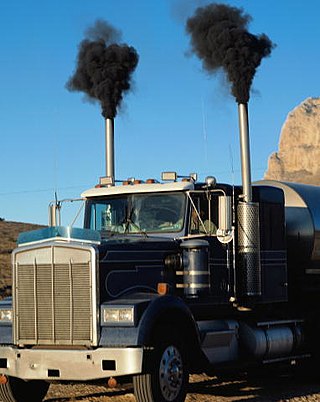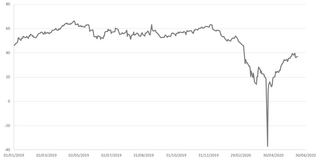The economic calculation problem is a criticism of using economic planning as a substitute for market-based allocation of the factors of production. It was first proposed by Ludwig von Mises in his 1920 article "Economic Calculation in the Socialist Commonwealth" and later expanded upon by Friedrich Hayek.

Macroeconomics is a branch of economics which deals with the performance, structure, behavior, and decision-making of an economy as a whole. For example, using interest rates, taxes, and government spending to regulate an economy's growth and stability. This includes regional, national, and global economies. According to a 2018 assessment by economists Emi Nakamura and Jón Steinsson, economic "evidence regarding the consequences of different macroeconomic policies is still highly imperfect and open to serious criticism."

In economics, stagflation or recession-inflation is a situation in which the inflation rate is high or increasing, the economic growth rate slows, and unemployment remains steadily high. It presents a dilemma for economic policy, since actions intended to lower inflation may exacerbate unemployment.

In economics, inflation is an increase in the general price level of goods and services in an economy. When the general price level rises, each unit of currency buys fewer goods and services; consequently, inflation corresponds to a reduction in the purchasing power of money. The opposite of inflation is deflation, a sustained decrease in the general price level of goods and services. The common measure of inflation is the inflation rate, the annualized percentage change in a general price index. As prices do not all increase at the same rate, the consumer price index (CPI) is often used for this purpose. The employment cost index is also used for wages in the United States.

In economics, deflation is a decrease in the general price level of goods and services. Deflation occurs when the inflation rate falls below 0%. Inflation reduces the value of currency over time, but sudden deflation increases it. This allows more goods and services to be bought than before with the same amount of currency. Deflation is distinct from disinflation, a slow-down in the inflation rate, i.e. when inflation declines to a lower rate but is still positive.

In economics, an externality or external cost is an indirect cost or benefit to an uninvolved third party that arises as an effect of another party's activity. Externalities can be considered as unpriced goods involved in either consumer or producer market transactions. Air pollution from motor vehicles is one example. The cost of air pollution to society is not paid by either the producers or users of motorized transport to the rest of society. Water pollution from mills and factories is another example. All consumers are all made worse off by pollution but are not compensated by the market for this damage. A positive externality is when an individual's consumption in a market increases the well-being of others, but the individual does not charge the third party for the benefit. The third party is essentially getting a free product. An example of this might be the apartment above a bakery receiving the benefit of enjoyment from smelling fresh pastries every morning. The people who live in the apartment do not compensate the bakery for this benefit.

In finance, an exchange rate is the rate at which one currency will be exchanged for another currency. Currencies are most commonly national currencies, but may be sub-national as in the case of Hong Kong or supra-national as in the case of the euro.
In computer programming, tracing garbage collection is a form of automatic memory management that consists of determining which objects should be deallocated by tracing which objects are reachable by a chain of references from certain "root" objects, and considering the rest as "garbage" and collecting them. Tracing garbage collection is the most common type of garbage collection – so much so that "garbage collection" often refers to tracing garbage collection, rather than other methods such as reference counting – and there are a large number of algorithms used in implementation.
In psychology and behavioral economics, the endowment effect is the finding that people are more likely to retain an object they own than acquire that same object when they do not own it. The endowment theory can be defined as "an application of prospect theory positing that loss aversion associated with ownership explains observed exchange asymmetries."
In economics, overproduction, oversupply, excess of supply or glut refers to excess of supply over demand of products being offered to the market. This leads to lower prices and/or unsold goods along with the possibility of unemployment.

Frugality is the quality of being frugal, sparing, thrifty, prudent or economical in the consumption of consumable resources such as food, time or money, and avoiding waste, lavishness or extravagance.

In economics, a market is a composition of systems, institutions, procedures, social relations or infrastructures whereby parties engage in exchange. While parties may exchange goods and services by barter, most markets rely on sellers offering their goods or services to buyers in exchange for money. It can be said that a market is the process by which the prices of goods and services are established. Markets facilitate trade and enable the distribution and allocation of resources in a society. Markets allow any tradeable item to be evaluated and priced. A market emerges more or less spontaneously or may be constructed deliberately by human interaction in order to enable the exchange of rights of services and goods. Markets generally supplant gift economies and are often held in place through rules and customs, such as a booth fee, competitive pricing, and source of goods for sale.
In economics, economic value is a measure of the benefit provided by a good or service to an economic agent. It is generally measured through units of currency, and the interpretation is therefore "what is the maximum amount of money a specific actor is willing and able to pay for the good or service"?

Upcycling, also known as creative reuse, is the process of transforming by-products, waste materials, useless, or unwanted products into new materials or products perceived to be of greater quality, such as artistic value or environmental value.

In economics, profit is the difference between the revenue that an economic entity has received from its outputs and the total cost of its inputs. It is equal to total revenue minus total cost, including both explicit and implicit costs.

In economics, a demand shock is a sudden event that increases or decreases demand for goods or services temporarily.
Calculation in kind or calculation in-natura is a way of valuating resources and a system of accounting that uses disaggregated physical magnitudes as opposed to a common unit of calculation. As the basis for a socialist economy, it was proposed to replace money and financial calculation. Calculation in kind would value each commodity based on its utility, for purposes of economic accounting. By contrast, in money-based economies, a commodity's value includes an exchange value.
This glossary of economics is a list of definitions of terms and concepts used in economics, its sub-disciplines, and related fields.
In Egypt, waste and lack of proper management of it pose serious health and environmental problems for the country and its population. There has been some governmental attempts to better the system of waste management since the 1960s but those have not proven sufficient until now. In the last 10 years focus on this issue and solutions to it has increased both from the government and civil society. Some attempts at recycling are present, and growing in the country. But these are largely informal or private actors, and government initiatives are necessary to properly manage these systems and provide them with appropriate resources.

In economics, negative pricing can occur when demand for a product drops or supply increases to an extent that owners or suppliers are prepared to pay others to accept it, in effect setting the price to a negative number. This can happen because it costs money to transport, store, and dispose of a product even when there is little demand to buy it.







